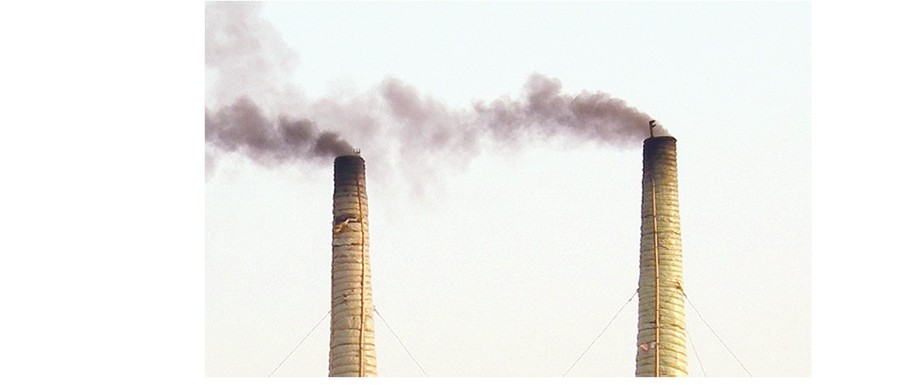Brick kilns jeopardising environment, health

By Indira Aryal
Bhaktapur, Dec 1: Locals residing at Jagate and Suryabinayak in Bhaktapur district complain over the environmental hazard caused by smoke and dust emitted from the unmanaged brick kilns in the area.
Brick production is a very large and traditional industry in Bhaktapur. With the rapid production of bricks and unmanaged urbanization, people residing near the brick kilns factory have started to complain about the environmental threats.
A local at Jagate, Muna Karki said that they had no choice but to escape the pollution. Karki, a permanent president in the area, said they would be happier if the government removed the kilns from the area.
“We are getting employment at the nearby kiln factory but it is not about employment, we want a clean environment,” she added.
Karki is one of 500 workers at the Chinese Bricks kiln in Jagate. She said the industry had also employed locals but more workers were from adjoining districts such as Kavre, Ramechhap.
Krishna Ram, 45, a local resident at Jagate said that he had been working there for the last seven years. His job is to bring baked bricks. “”It’s really hard to work inside because of high temperatures despite the health hazards, but we work because we get paid,” he said.
Apart from the threats to public health, the workers at the kilns are under more serious health risks as they work without wearing protective gear and directly inhale the gases. The factory provides masks to them but it is not that easy to wear a mask all the time, so we work without any safety measures, Ram said.
The use of large quantities of coal in brick kilns contributes significantly to emissions of carbon dioxide, particulate matter, including black carbon, sulphur dioxide, oxides of nitrogen and carbon monoxide, says a report recently published by the Department of Environment.
In-charge of the Bhaktapur Bricks Kilns and Tile Industry Raju Thapa said that they have been providing sufficient safety measures at the work-place. He said around 500 people are working in the factory. He claimed the factory covered 255 ropanies of land and produced less smoke than other small industries as they had a taller chimney.
Data from Cottage and Small Scale Industry in Bhaktapur show there are 63 brick kilns in the district, each employing hundreds of workers, most of whom bring their children to work with them. Many of these workers have no one to look after their children, and cannot afford to send them to schools.
Krishna Prasad Awal, General Secretary at the Federation of Nepal Bricks Kiln said that there were 63 registered Kilns in Bhaktapur but also a few factories were operating without registration.
In Bhaktapur alone, over 25,000 workers are employed in the Brick Kiln. “Every Brick Kiln in Bhaktapur has at least 400 workers utilized during the season and some of them come with children, and we cannot tell them not to bring their children. So, the Federation has operated three Child Care Centres in Bhaktapur for the worker’s children so that the pollution will not affect the children,” Awal said.
According to Awal, the Federation has prohibited child labourers in the factories and following the government regulation to control air pollution.
Environmentalist Krishna Das said the smoke coming out of the Kiln factory was the main threat to public health. The unmanaged urbanization and increasing bricks factories are the causes of many diseases in the Valley. For the last few years, we’ve just heard about dengue, but now we are viral for the disease inside the valley, just because of the rising temperatures in the Valley, he informed.
Das said that the gas that had come out from the Kiln was the main problem during the winter season in Kathmandu. The season of bricks production has started now and we can see people suffering from different diseases like asthma, allergy, and cough during the season because of the pollution and smoke.
The carbon gas coming out of the Kiln has had the main impact on global warming which has we can see in recent years in Kathmandu,” Das added. Air pollution is the second cause of death in Nepal, he informed.
There are over 100 registered Brick Kiln in Kathmandu Valley. The mushrooming of such industries is due to rapid population growth and urbanization that enhance the needs of urban residents for food, energy, and shelter.
(Aryal was asked to contribute the story)
Recent News

Do not make expressions casting dout on election: EC
14 Apr, 2022
CM Bhatta says may New Year 2079 BS inspire positive thinking
14 Apr, 2022
Three new cases, 44 recoveries in 24 hours
14 Apr, 2022
689 climbers of 84 teams so far acquire permits for climbing various peaks this spring season
14 Apr, 2022
How the rising cost of living crisis is impacting Nepal
14 Apr, 2022
US military confirms an interstellar meteor collided with Earth
14 Apr, 2022
Valneva Covid vaccine approved for use in UK
14 Apr, 2022
Chair Prachanda highlights need of unity among Maoist, Communist forces
14 Apr, 2022
Ranbir Kapoor and Alia Bhatt: Bollywood toasts star couple on wedding
14 Apr, 2022
President Bhandari confers decorations (Photo Feature)
14 Apr, 2022











